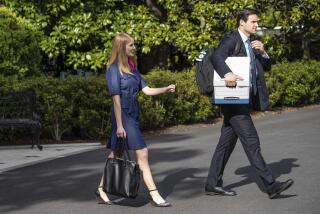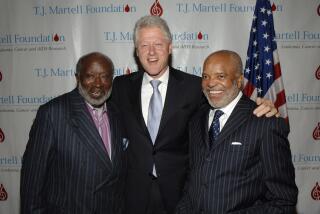Ex-Counsel Says He Warned Deaver Against Lobbying
- Share via
WASHINGTON — Former White House counsel Fred F. Fielding, testifying at the perjury trial of Michael K. Deaver, said Tuesday that he repeatedly warned the former White House aide and his business associates against lobbying presidential assistants.
But Fielding told jurors that Deaver, soon after resigning as President Reagan’s deputy chief of staff in May, 1985, insisted that he must speak with then-National Security Adviser Robert C. McFarlane about a Caribbean tax issue for which he was lobbying. Deaver, according to previous testimony, contacted other White House aides as well.
Fielding gave his testimony as Whitney North Seymour Jr., the court-appointed prosecutor, neared completion of his case. Defense attorneys said that they expect to start presentation of their client’s case Monday, possibly by putting Deaver on the stand.
May Provide Motive
Although Fielding’s testimony did not bear directly on the perjury charges against Deaver, Seymour indicated it might help provide a motive for Deaver’s alleged lying last year to a congressional subcommittee and a federal grand jury investigating his lobbying activities.
The prosecutor has told jurors that Deaver tried to cover up the wide scope of his lobbying to save old friends from embarrassment and to preserve his government contacts as well as his lucrative business.
Another witness, Washington attorney Andrew Singer, recalled Deaver being interrupted at a meeting Oct. 10, 1985, to receive word from his secretary that First Lady Nancy Reagan was on the phone.
Close Personal Friends
“Tell her I’ll call her back,” he quoted Deaver as responding. Deaver and his wife, Carolyn, have been close personal friends of President Reagan and his wife for nearly 20 years, dating back to Reagan’s days as governor of California.
It was the second time that Mrs. Reagan’s name has come up in testimony. Earlier this month, a business client of Deaver told of returning a phone call from the former presidential aide by dialing a special White House number and asking for “Foxtrot.” He said he was connected to Deaver aboard Mrs. Reagan’s airplane.
Fielding, the principal witness Tuesday, said he told William Sittmann, a Deaver associate, less than a month after Deaver established his lobbying business that Sittmann, Deaver and other associates--most of whom had worked at the White House--”should not attempt to make any contacts with people at the White House.”
The former White House counsel said he acted after some presidential aides had expressed concern about the ethics of such contacts. Under the 1978 Ethics in Government Act, former high-ranking officials are forbidden to lobby their ex-colleagues for 12 months after leaving government service.
Fielding said he later passed the warning to Deaver directly and advised McFarlane not to meet with Deaver.
McFarlane testified earlier in the trial that, acting upon Fielding’s advice, he canceled a meeting with Deaver at which a tax matter dealing with Puerto Rico was to be discussed. McFarlane said that Deaver subsequently dropped by his office unannounced but that he could not remember what was discussed on the second occasion.
Deaver, while representing the investment firm Smith Barney at the time, was seeking to preserve a U.S. income tax break for American companies with investments in Puerto Rico.
Another witness to testify Tuesday, William Martin, a former National Security Council aide who worked for McFarlane, said that Deaver invited him to lunch in June, 1985, and told him he was making a trip to South Korea to line up a client there.
“Deaver mentioned it would be nice to have a letter of introduction to President Chun Doo Hwan from President Reagan,” Martin said. He added that Deaver did not directly ask him to obtain such a letter and that he, in fact, took no action on Deaver’s remark.
Previous testimony has established that Deaver presented such a letter to Chun and subsequently obtained a $475,000 contract from the South Korean government to advise them on trade matters.
More to Read
Get the L.A. Times Politics newsletter
Deeply reported insights into legislation, politics and policy from Sacramento, Washington and beyond. In your inbox twice per week.
You may occasionally receive promotional content from the Los Angeles Times.










